- Type of Hakhshara
- Middle Hakhshara (Mi-Ha), regular Hakhshara
- Founded
- 1933
- Opened
- January 1934
- Closed
- November 1938
- Operating Area
-
23.64 hectare23.64 hectares as of December 1938
According to the 1931 operating statistics for the property (one year before it was purchased by Rudolf and Leo Stern), the property had a total area of 31 ha, with 10 ha of arable fields, 14 ha of meadowlands and pastures, 4 ha of forest and 3 ha of farmyard, paths and barren land.
In mid-November 1938, the stables held 10 cows, 4 steer, 3 horses, 2 foals, 20 pigs and around 40 chickens. - Areas of Training Offered
-
home economics, woodworking, agriculture, animal husbandryLivestock farming (cattle, horses, pigs), poultry farming (chickens), arable farming (grain, potatoes), home economics (nutrition, textile care, gardening)
- Description
-
On November 15, 1932, Rudolf Stern, a horse dealer, and his brother Leo Stern, a businessman, both of Osnabrück, purchased the Elstroth farm in Westerkappeln during a foreclosure auction at the civil chamber of the district court in Münster. Their mother Ida Stern was registered as the owner, giving rise to the name “Stern farm estate”.
According to the restitution file from 1950, the Stern brothers had entrusted the farmstead with all farm buildings and land to the Reich Representative of German Jews to be used as a training center for young Jewish boys and girls preparing them for their emigration to Palestine. However, according to a report by the Sicherheitsdienst of the SS Düsseldorf from July 3, 1936, the retraining camp “was affiliated with the Prussian state association of Jewish communities”. It was run by the Jewish scouting association Maccabi Hazair. The Hakhshara began operating on the farm in January 1934 with the arrival of the first three chaverim: Henry Cohen from Altkarbe, Edgar Adamski from Leipzig and Markus Lichter from Chemnitz.
Working as caretakers on the farm were: Franz Wiegmann and his wife Anna née Gode (March 1933 to October 1934), Arnold Houben and his wife Wilhelmine née Röver (September 1934 to October 1935), Alois Krösche (1936-1938) and Siegfried Löwenstein and his wife Dora, née Stern (May 1938 to November 1938). In addition, for a time there was a teacher, a farmhand or a gardener and a housekeeper who was responsible for the cooking and running the household.
According to the registration files in the district administration in Westerkappeln, between January 1934 and November 1938, a total of 97 adolescents and young adults had lived as chaverim on the farm; 33 were female and 66 male. They were on average 19 years old on arrival. They came from Berlin (19 people), Essen (8), Leipzig (7), Cologne (5), Düsseldorf (4), small towns abroad like Jever, Herzlake, Burgsteinfurt or Warburg or villages like Madfeld near Brilon, Westerstede in Ammerland, Volzel in the County of Bentheim or Klafeld near Geisweid (Siegen). Seven people came to Westerbeck from other Hakhshara centers. Four people came from Altkarbe, with one person each from Ahlem, Ahrensdorf and Harksheide.
The length of stay varied between a few weeks and – in two exceptions – almost two and a half years. The median stay was around 190 days. Apparently, there were no fixed-schedule training courses in more or less set groups. Rather, the entries at the city registry for the period between January 1934 and January 1938 show an irregular coming and going. The young people apparently left the Stern farm estate as soon as they were able to make Aliyah. However, there is one noticeable exception. On February 18, 1938, a group of 18 left the farm together.
In the following months, from March to August 1938, only five chaverim came to the farm according to the registration documents. In addition, there were nine boys between the ages of 10 and 14 who arrived in July / August 1938 from Darmstadt, Essen, Hanover and Osnabrück among other places, and spent a few weeks on the farm as Ferienkinder or children on vacation.
In the pogrom night of November 9/10 1938, members of the SA attacked the farm. The caretaker couple Löwenstein were brutally mistreated, the furnishings destroyed and window panes smashed. Four young men were still living on the Stern farm at this time. They were arrested along with the caretaker Siegfried Löwenstein and jailed in Westerkappeln. Löwenstein was able to return to the farm after a week, but the four men were taken to the Buchenwald concentration camp for several weeks. They were able to return to the Stern farm for a short period, but had to leave it for good in February 1939.
The owner and landlord Rudolf Stern was arrested on the night of the November Pogrom in 1938 and deported to the Buchenwald concentration camp, where the Gestapo forced him to sell the farm.
On December 3, 1938, the farm was sold to Heinrich Pöppelwerth, a farmer from Haustenbeck/Lippe. Until then, he had owned a farm that he had had to relinquish due to the Wehrmacht’s expansion of the military training area in Senne.
In 1941, Rudolf Stern was deported to the ghetto in Riga. In September 1944, he was deported via the Stutthof concentration camp to the SS concentration camp Libau (Liepaja, Latvia). He survived the end of the war in Kiel in a subcamp of the Neuengamme concentration camp, and in February 1946, he returned to Osnabrück. A short while later, he demanded the restitution of his farm. The district court in Münster ruled in his favor on March 28, 1952, declaring the 1938 sale null and void and awarding Stern ownership of the property. Shortly thereafter, Stern and Pöppelwerth reached an out-of-court settlement, the details of which are unknown.
In June 1952, Rudolf Stern was entered in the land register as the old and new owner of the farm. After his death on January 20, 1957, “based on the certificate of inheritance from the district court in Osnabrück”, his second wife Herta Stern (née Emmerich) became the sole heiress to his estate and thus also the owner of the farm. Around 1960, the farmer Heinrich Pöppelwerth bought the farm from her. His descendants are the owners of the farm today.
Up to now, there are no commemorations such as a memorial plaque about the former Hakhshara site. Indeed, memories of the Stern farm in the Westerkappeln community and the surrounding area have remained faint for decades. In local and regional-historical research in Jewish history, the farm in Westerkappeln has sometimes been mentioned in passing, but never researched in depth. There are many reasons for this, which often apply to other Hakhsharot: for example, a lack of analysis of what took place on the farms, particularly during the pogrom in 1938 and the downplaying of the pogrom. This attitude can already be seen in the reply on November 4, 1946 from the Westerkappeln city administration and the Tecklenburg chief executive to an inquiry of from the Jewish Central Historical Commission in Munich. The Westerkappeln officials talk about “Jews migrating abroad” after the pogrom in 1938, and that the Jews in Westerkappeln had “their own agricultural training camp” that was “closed down after the Judenaktion (pogrom)”. Why they “migrated” and who “closed down” the camp in what way is not shared. These formulations reflect a downplaying and falsification of the actual events and correspond to the pattern of silence, reinterpretation and suppression that is also effective across regions.

© Gisbert Strotdrees
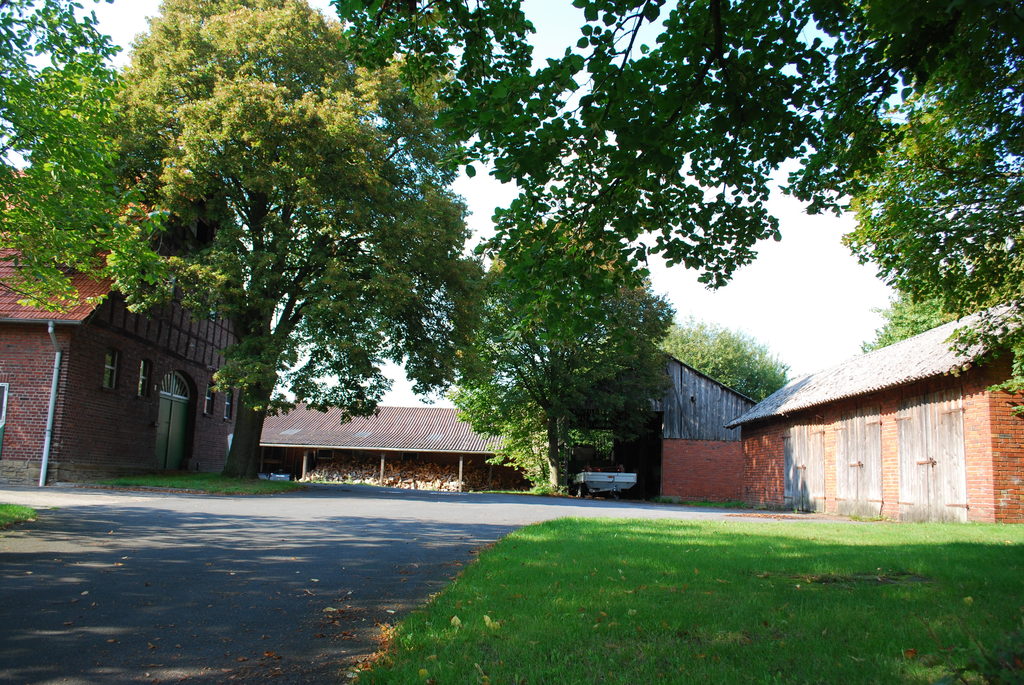
© Gisbert Strotdrees
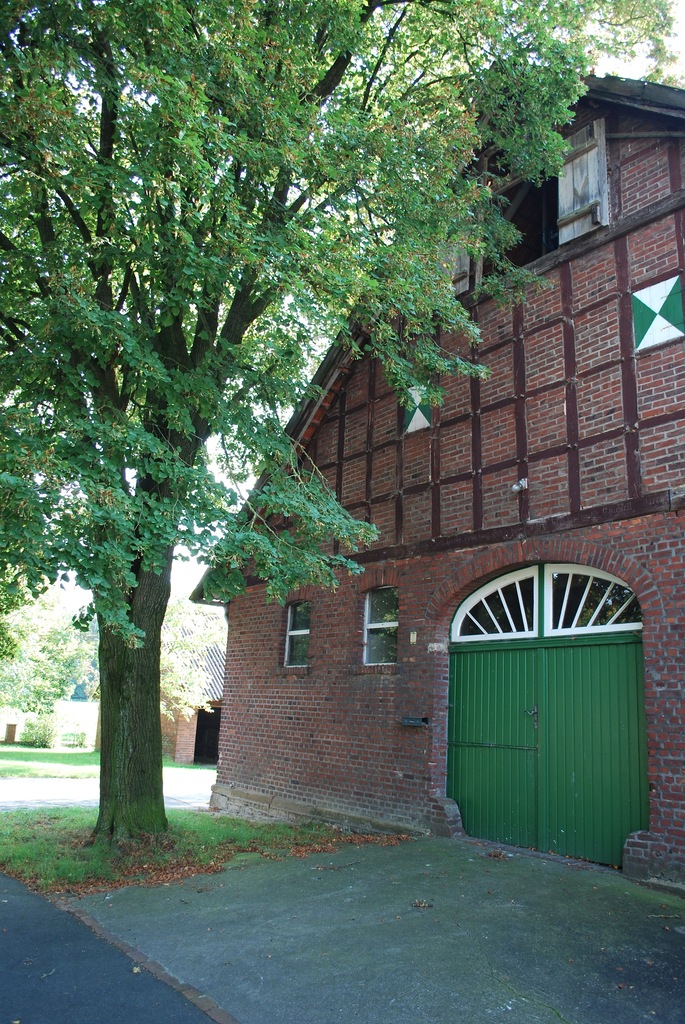
© Gisbert Strotdrees
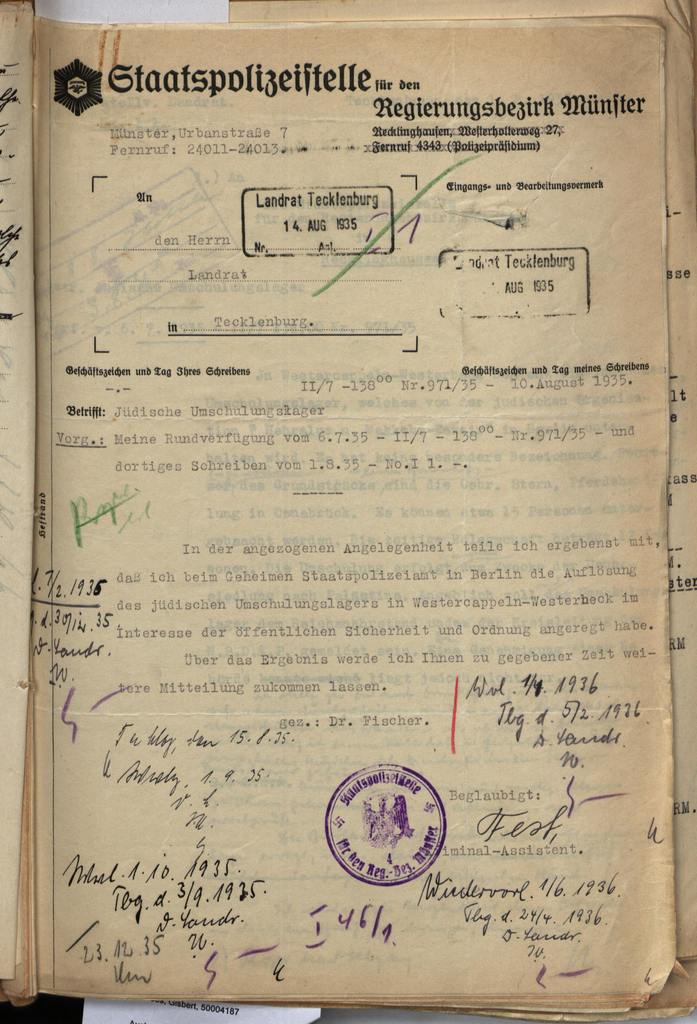
© NRW-Landesarchiv, Abt. Westfalen, Münster
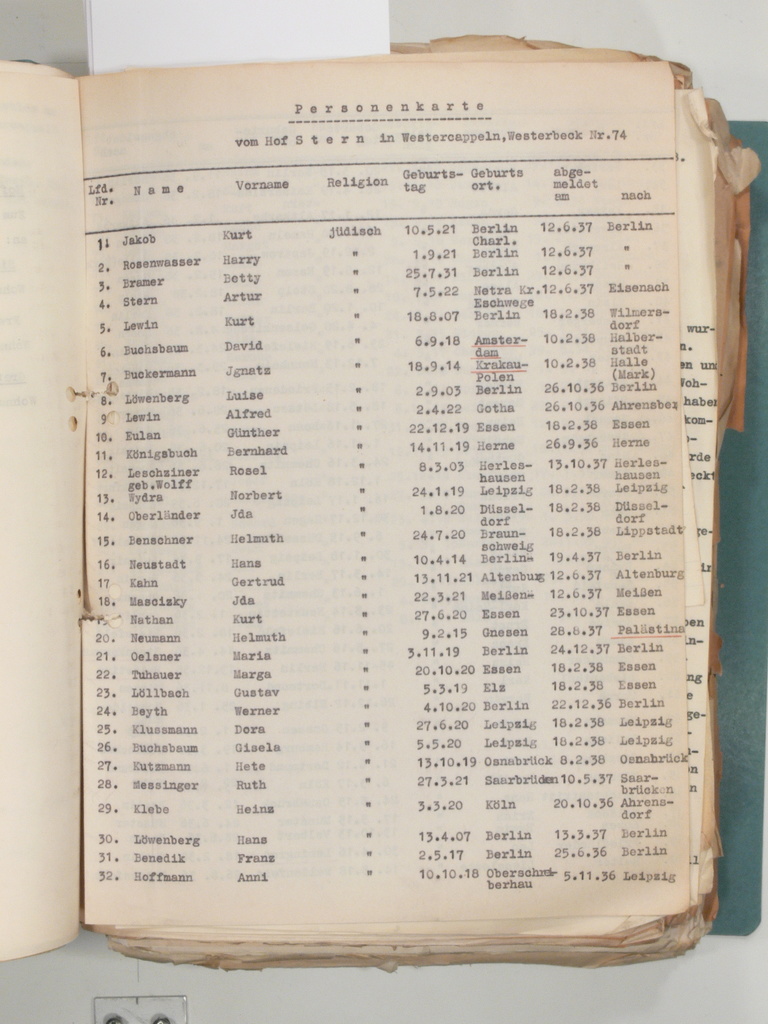
© Gemeindearchiv Westerkappeln
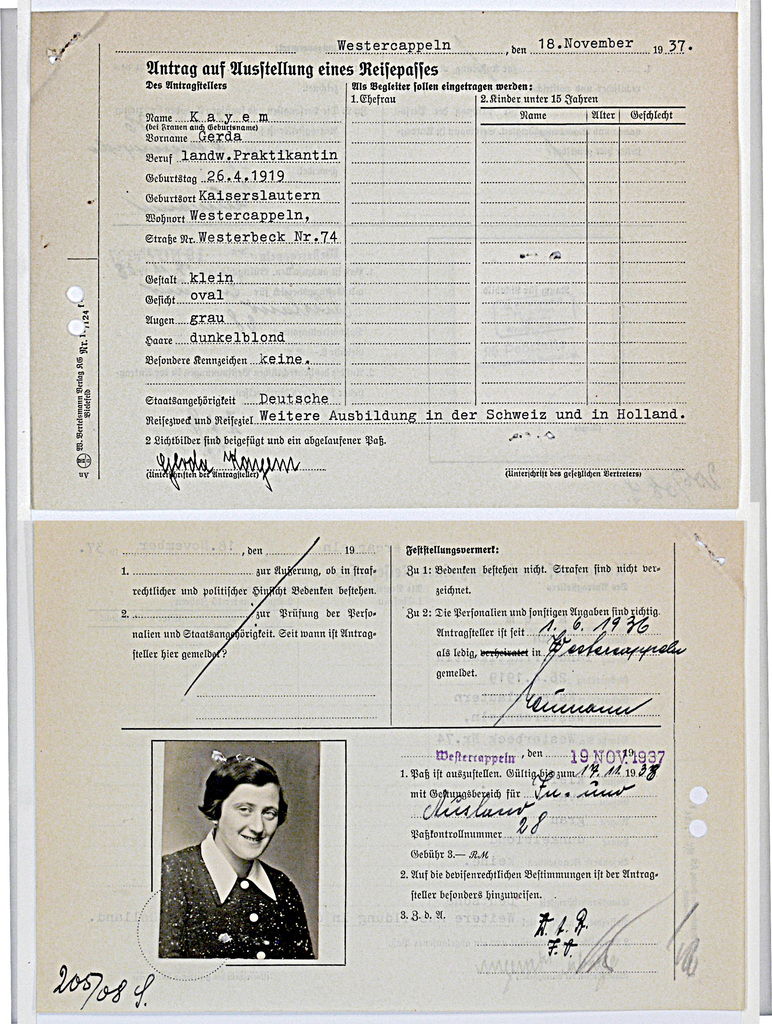
© Gemeindearchiv Westerkappeln
- State of Conservation
-
partially preserved
The main building and the barns are still standing, but have been renovated and modernized several times.
- Related Organizations
-
Jüdischer Pfadfinderbund Makkabi Hazair (sponsor)
- Related Persons
-
Houben, Arnold (director)Houben, Wilhelmine (director)Krösche, Alois (director)Löwenstein, Dora (director)Löwenberg, Hans (director)Löwenstein, Siegfried (director)Stern, Ida (owner)Stern, Leo (owner)Stern, Rudolf (owner)Wiegmann, Anna (director)Wiegmann, Franz (director)
- Sources and Notes
-
Gemeindearchiv Westerkappeln (Meldelisten zum Hof Stern aus dem Einwohnermeldeamt Westerkappeln 1930–1950; Akte B 141 „Polizei / Hoch- und Landesverrat“)
NRW-Landesarchiv Münster, Abt. Westfalen, Münster (Kreisbauernschaft Tecklenburg Nr. 79; Landratsamt Tecklenburg Nr. 917; Amtsgericht Tecklenburg Grundakten Nr. 4681; Rückerstattungen, Akte Nr. 14893).
Arolsen Archives – International Center on Nazi Persecution, Bad Arolsen: Akte S 23832 (R. Stern, Osnabrück).
Archiv Yad Vashem, Jerusalem – Ref. No 284175 M 1 L 285 (Kreisverwaltung Tecklenburg an Central Historical Commission of the Central Commitee of Liberated Jews in US-Zone, München, 4. November 1946).
Kurt Lewin (Hachschara-Kibbuz Westerbeck): Mittleren-Hachschara, in: Der Makkabi, Nr. 1, 31.1.1938, S. 3f. - Literature
-
Anke Beimdiek: Die SA hat alles kaputt geschlagen. Erinnerungen an den Hof Stern, in: Westfälische Nachrichten. February 28, 2006.
Peter Junk; Martina Sellmeyer: Stationen auf dem Weg nach Auschwitz. Entrechtung, Vertreibung, Vernichtung – Juden in Osnabrück 1900-1945. Bramsche: Rasch Verlag 2000.
Ulrike Pilarczyk: Chalutzim – Zionist Photography in Germany and Palestine in the 1930s. A Comparative Analysis of Images, in: The Leo Baeck Institute Year Book 64 (1) (2019). pp. 91–114. online: <https://doi.org/10.1093/leobaeck/ybz009>
Gisbert Strotdrees: Eine Minderheit in der Minderheit. Jüdische Landwirte und Landeigentümer in Westfalen von den Emanzipationsgesetzen bis zur nationalsozialistischen „Arisierung“ (1800–1939/42), in: Iris Nölle-Hornkamp (ed.), Heimatkunde. Westfälische Juden und ihre Nachbarn, Ausstellungskatalog Jüdisches Museum Westfalen. Essen: Klartext Verlag 2014. pp. 67–79 (zum Hof Stern 72–77).
Gisbert Strotdrees: Ein Kibbuz in Westfalen, in: Jüdische Allgemeine. January 22, 2015. p. 3. online: <https://www.juedische-allgemeine.de/kultur/ein-kibbuz-in-westfalen/>
Gisbert Strotdrees: Fluchtpunkt Landwirtschaft. Auf Hachschara in Westfalen., Spurensuche_n im Gestern und Heute. Jüdisches Leben in Münster und im Münsterland. Digitales Ausstellungsprojekt der Westfälischen Wilhelms-Universität Münster 2021. 2021. <https://2021jimsl-spurensuche-n.de/hachschara-hof-stern-westerkappeln/>
Recommended Citation
Gisbert Strotdrees, Kibbutz Westerbeck (Hof Stern / Stern farm estate), in: Hakhshara as a Place of Remembrance, December 12, 2022. <https://hachschara.juedische-geschichte-online.net/en/site/4> [February 27, 2026].